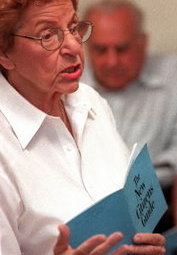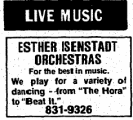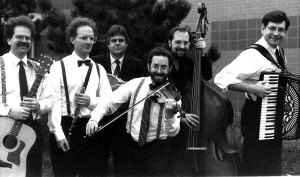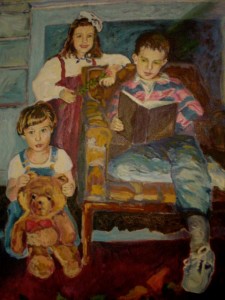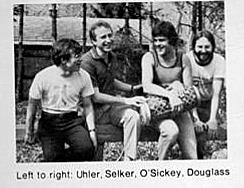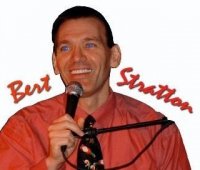Category — Klezmer
THE ESTHER ISENSTADT ORCHESTRAS
Bass player Esther Isenstadt ran classified ads in the back of the Cleveland Jewish News in the 1970s and 1980s: “Sophisticated music for discriminating people” . . . “Leave your records at home and bring LIFE to your party” . . . “From ‘The Hora’ to ‘Beat It.'”
Esther was gigging regularly when Yiddishe Cup started in 1988. I didn’t run into her. She was working the senior-adult circuit, while Yiddishe Cup was doing the glam jobs: bar mitzvahs and weddings. Esther was not a klezmer musician. She played mostly classical and pop — and some Jewish.
When I eventually met Esther, she was in The Weils assisted living facility. She was 86 (2003). She approached me after a Yiddishe Cup senior-adult program to say hello. I told her I knew of her. She smiled. I had one of her songbooks; I said I bought it used at the Cleveland Music School Settlement. She smiled again. Then she didn’t smile. She said, “I never thought I’d end up here!”
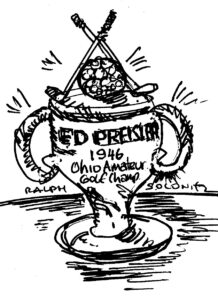 Ed Preisler — another Weils resident — chimed in, “I came out here to die.” (Ed died six months later.) Ed was the 1946 Ohio Amateur Golf Champion.
Ed Preisler — another Weils resident — chimed in, “I came out here to die.” (Ed died six months later.) Ed was the 1946 Ohio Amateur Golf Champion.
Ted Bonda, the former owner of the Cleveland Indians, was also there. I switched gears; I asked Ted, Ed and Esther — and the other people schmoozing after the program — if they knew Mickey Katz. One resident knew Mickey from Yale Avenue, Cleveland; another, from Berkshire Road, Cleveland Heights.
I asked the group if they were familiar with the word kile (hernia). Nobody knew it. That was surprising. Kile is the punch line in Mickey Katz’s song “16 Tons [of Hard Salami]” . . . “The balebus (boss) promised me a real gedile (glory), instead of geldile I catched me a kile (hernia).” The Weils was apparently not heavy-duty Yiddishists.
Esther Isendstadt had played in four suburban orchestras, raised a family, taught elementary school, led party bands and taught ESL in “retirement.” She was a Glenville High graduate, as were Bonda and Preisler. Glenville High was where Jewish overachievers went to high school in the 1930s. [John Adams High students — like my parents — would have disagreed with that. John Adams, in the Kinsman neighborhood, was more proste (working-class) than Glenville, but equally proud.]
I learned “Shir Lashalom” (A Song of Peace) from Esther’s book. That tune was a must-play in 1995 — the year Yitzhak Rabin was assassinated. The lyrics were in Rabin’s pocket when he got shot.
Esther had rubber-stamped Esther Isenstadt Orchestras on every other page of the used song book. A Jewish bandleader with a rubber stamp.
I got a rubber stamp.
Esther died last month at 93.
There weren’t many bands with names like the Esther Isenstadt Orchestra in the 1970s. There still aren’t.
—-
Illustration by Ralph Solonitz.
November 19, 2010 5 Comments
Y TU VIOLIN TAMBIÉN
From klezmer violinist Steven Greenman‘s “lawyer”:
Postscript: Galitzianers, please note, Greenman’s class begins Thursday (Nov. 18) in Santiago de Compostela, Spain.
***
Vid-loathers, here’s pretty much the same thing as the video, in text:
Klezmer violinist Steve Greenman asked my help in translating a Spanish contract. He thought he had a gig in Spain but wasn’t sure.
The contract wasn’t in Spanish. It was in Catalan, I guessed. Terceiro for tercero, for example.
We looked at an atlas. Verdict: Steve was going to Santiago de Compostela in northwest Spain, where he would teach master violin classes. The Spaniards probably had some local language up there. [Yes. Galician/Gallego.]
I said to Steve, “I saw a movie about a guy in a wheelchair filmed there. Can’t remember the name. It’s exotic. It’s nowheresville.” [The Sea Inside, 2007.]
Just another day for Greenman, who expects to get gigs in faraway places. He thinks the world will come to him because he has never made a mistake on violin. A klezmer gig in northwest Spain . . .
I was glad to be a part of it, even if my role was just to say “I have no idea what this contract says.”
November 12, 2010 2 Comments
THE MIDWEST’S TOP 10 KLEZMER
. . . TOWNS
My nephew visits Big League baseball stadiums around the country as a hobby.
I visit Big League klezmer towns in the Midwest as a hobby. My remarks (below) are challah-to-challah comparisons. I’m not comparing Milwaukee to Paris.
The best Midwest klezmer towns:
1. Pittsburgh . . . Squirrel Hill, Shadyside. Everything you need. (Pittsburgh is not in the Midwest, but so what. It is west of the Alleghenies.)
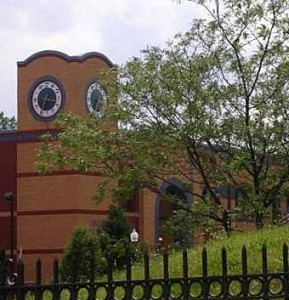
Hebrew clock. Pittsburgh JCC
2. Chicago. The Midwest klez capital. Maxwell Street Klezmer Band is the band in the Midwest. A Cleveland boy — a Northwestern student — worked in the Maxwell Street office; I had that kid wired. Yes, a klez band with office help. Chi is that big. Powerful klezmer forces prevail in Chi. Max Street does not allow Ohio bands within 80 miles of The Loop. Yiddishe Cup played Rockford, Ill., once.
3. Detroit. West Bloomfield, a Motown suburb, has Temple Israel, a very attractive modern temple. There is such a thing. At concerts, the Temple Israel ark is curtained off by a striking yarmulke mandala.
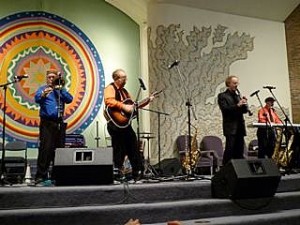
Yiddishe Cup at Temple Israel, 2010
4. Kansas City — as marvelously tough as Cleveland. KC’s Country Club Plaza is like Shaker Square but bigger and older.
5. St. Louis. Yiddishe Cup played there twice, then it all died out — the gigs. My Cleveland rabbi, who is from St. Louis, has a couple seats from the old Busch stadium. He should install the seats on our shul’s bima (altar) and invite Enos Slaughter to give the d’var torah (torah lesson/sermon). Good custard — Ted Drewes — in St. Louis. Similar to Cleveland’s East Coast Original Frozen Custard.
6. Milwaukee. Its claim to fame: songwriter Sigmund Snopek III, who wrote “Thank God This isn’t Cleveland.”
7. Minneapolis. There are a lot of klez bands up there: Prairie Heym Klezmorim, Klezmerica, etc. Too much klez in Minnie. Yiddishe Cup will never play there.
8. Cincinnati. The Plum Street Temple, where Stephen Wise officiated, is the most rakish and Moorish synagogue in the country. Check it out.

Plum Street Temple
9. Buffalo. Terrific art museum. Underrated.
10. Indianapolis. Overrated. A suburb of Atlanta.
Cleveland isn’t ranked. That wouldn’t be fair. But off the record, Cleveland is number one.
November 3, 2010 5 Comments
THE CHOCOLATE FLOWS LIKE A RIVER
At a candy-theme bar mitzvah, the dessert table is tortes and truffles, and the kids’ table is do-it-yourself ice cream sundaes and candy bars.
The bar mitzvah boy — the candy man– has a custom-printed candy bar named after him. The nutrition data reads: “Serving size — 1 young man. Ingredients — charm, wits, humor . . .”
Yiddishe Cup wants its own candy bar. It’ll be dark chocolate with slivers of old clarinet reeds. We’ll put these treats in the goodie bags for the bar mitzvah kids.
Any leftovers, we’ll take to Yiddishe Cup’s haunted house. This year our torture chamber features Don Friedman, our drummer, telling nonstop Internet musicians’ jokes like “What is the definition of an optimist? A trombonist with a beeper.”
Any leftover chocolates from the haunted house, we’ll give to our keyboard player, Alan Douglass, who is good for a candy bar and diet pop many mornings. Repeat at bedtime. I bought him a Snickers at a gas station and he refused it. It has to be MilkyWay or Three Musketeers.
***
The candy expert is Steve Almond, author of Candy Freak.
I, too, did some candy reporting, but I didn’t have the name for a career in it. In the 1980s I interviewed a chocolate factory owner who claimed dark chocolate was a Jewish thing. Maybe because of kashrut? [Jewish dietary laws]
Yes, a lot of Jews prefer dark chocolate. For one thing, it is a health food.
This year Yiddishe Cup is trick-or-treating as klezmer musicians. Yes, again. But with a twist: we’re ditching the Tevye vests and caps, and going as chocolate fountains with silver-foil Frank Gehry antlers dripping Hershey’s syrup onto our faces.
—-
1 of 2 posts for 10/27/10. Please see the post below too.
October 27, 2010 8 Comments
“I DO NOT LIKE RICH PEOPLE”
A Yiddishe Cup musician, loading in at a country club, said, “I do not like rich people.”
You talkin’ to me?
What’s the median household income in the United States — $50,000?
I had access to Alan Dershowitz’s cell phone number. He did the Electric Slide at a bar mitzvah party. (I wasn’t playing; I was a guest.) I could have posted Dershy’s dorky disco on YouTube, but why embarrass a landsman – and maybe get sued. [“Landsman” means paisan.]
Dershowitz has a place on the Vineyard, I learned. Dershy is rich. “Rich” is pronounced “well-off.”
Maybe my band mate, at the country club, was upset because the club’s manager, Kim, wouldn’t let us in the buffet line, and had told us to drink only lemonade, not even pop. And we couldn’t go into the kids’ buffet line, even with all the fried junk there. [Kim is not her real name.]
We got cold-cut sandwiches around 2:30 p.m. This, for lunch?
I’ll eat anything. The video guy wouldn’t. (Later, he would.) He said, “It is truly a disgrace to serve this to professionals.” He said that to the musicians, not the manager.
I do not like rich people . . .
Photographer Herb Ascherman got a decent meal. No wraps for Herb. In his contracts, Herb has the line “client will provide a hot meal.” Herb knows how to deal with rich people and Kim, who is rich, but not well off.
—-
2 of 2 posts for 10/6/10
October 6, 2010 1 Comment
PORTRAITS
Two-thirds of the art in my house is by Irwin Weinberger, Yiddishe Cup’s singer. Irwin is also a painter and middle-school art teacher.
He did a portrait of my kids 19 years ago. I thought the kids — those pipsqueaks — were cute. But their pipsqueak phase dragged on for years; I would stare at that painting and say, “Grow up already!” Schlepping kids crosstown to gymnastics meets was not fun. Schlepping the youngest child to an 8 a.m. hockey game in Parma Heights was not fun. Sitting through my daughter’s swim meets was not entirely pleasant. (The diving part was pleasant, but the swimming races — which she had nothing to do with — weren’t fun.)
As it turned out, the whole thing — childrearing — lasted about two weeks.
Yiddishe Cup has been in existence 21 years, and that, too, has felt like two weeks. One day — back in 1989 — we were playing a Cleveland Heights street fair, and the next day– 21 years later– we were playing a Cleveland Heights street fair.* What’s with that?
We — the Yiddishe Cup musicians — enjoy the short drive to work. We are in our own backyard, kind of like the working musicians in Las Vegas or Branson, Mo. The downside to playing Cleveland a lot is everybody has heard us a million times.
Make it new. Or go nuts.
The newest Yiddishe Cup recruit, our drummer, has been with us 12 years. We have new music, but not new guys.
I rarely put the musicians’ names front and center. It’s all about Team Yiddishe Cup. What if a Yiddishe Cup “star” leaves? That would mess up the band’s publicity.
The band’s PR photos are like my family portrait. Same guys, basically. Why change the photos? We look the same as we did in the 1990s. I think so. It’s the same guys.
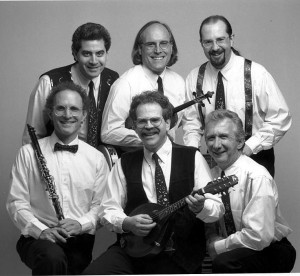
Yiddishe Cup, 1998. An outtake. The arrow in Irwin's head messed up this shot. (Photo by Charles J. Mintz)
—
* Footnote: Yiddishe Cup did not play a Cleveland Heights street fair in 2010. However, the band did play Parade the Circle in University Circle — close to, but not in, Cleveland Heights. And last year the band played for the outdoor movie/concert night at Coventry (Cleveland Heights).
—-
2 of 2 posts for 9/8/10.
L’shana tovah. (Happy New Year.)
Yiddishe Cup is at Fairmount Temple Wed. Sept 29 and Park Synagogue Thurs. Sept. 30 for Simchat Torah. Cleveland.
September 8, 2010 4 Comments
“I’LL MISS THE BLISS”
When the Kleveland Klezmorim disbanded in 1990, bandleader Greg Selker said, “I’ll miss the bliss but not the arguing with bookers and musicians.”
He became an executive headhunter.
“I’ll Miss the Bliss.” Somebody should write that tune.
My musical bliss happens most often when I hear a new instrument with Yiddishe Cup — like when Steve Ostrow first played trombone with us; or Walt Mahovlich added accordion; or Gerald Ross, Hawaiian guitar; or Shawn Fink sang “Joe and Paul.”
Or when I had Donato’s pizza with pineapple.
Selker didn’t like arguing with band mates. Who does? Luckily I haven’t had that many arguments. The worst was when a musician told me to get lost, or words to that effect, when I wanted him to commit to additional Yiddishe Cup rehearsals.
Professional musicians — guys who do only music — get very annoyed if they perceive the bandleader is trying to own them. (“Own” is a sideman’s word. Bandleaders say “hire.”)
Career musicians demand their independence and right to follow the dollar. The bandleader can only request first call, which means the sideman has to check with the bandleader before taking a gig with band number two. That sometimes gets tricky. For instance, when Yiddishe Cup’s first call is a nursing home and the sideman’s second call is the Ancona (Italy) Jewish festival.
Selker quit too early. He could have played Ancona and other exotic festivals; the Kleveland Klezmorim were one of the first klez revival, klez-fusion bands. Selker slept at Frank London’s New York apartment, which in klezmer terms is equal to the Lincoln bedroom. (London is a founder of the Klezmatics.)
Another guest at London’s apartment was Yiddishe Cup’s keyboardist, Alan Douglass, an original member of the Kleveland Klezmorim. Alan slept at London’s when the Kleveland Klezmorim played Carnegie Hall . . . Carnegie Hall Cinema. The Kleveland Klezmorim accompanied silent Laurel and Hardy shorts in New York in 1985.
(A former Yiddishe Cup drummer played the Hollywood Bowl . . . parking lot. Yiddishe Cup played Severance Hall
. . . lobby.)
I took private lessons from Selker in 1987, which was a hassle because Selker was so footloose back then: It’s spring, Bert. I need to reschedule. I’m going for a walk in the Metroparks. I had arranged for babysitting for my kids. (Selker eventually had three boys and settled down big-time.)
Greg “I’ll Miss the Bliss” Selker . . .
At Yiddishe Cup concerts our first several years, I often thanked Selker from the bandstand. He told me to give it up. It was hard. No Selker, no Yiddishe Cup.
***
Alan Douglass sent me an email a year ago containing “cool ancient [klezmer] history,” as he called it.
Alan said the Kleveland Klezmorim drove all night from Cleveland to New York for the Carnegie Hall gig, winding up in a filthy New Jersey hotel. “Beer bottles on the window sills inside the room,” Alan said.
The band reconnoitered the next day on the steps of the Museum of Modern Art. “We played on the sidewalk,” Alan said. “Greg got a comeuppance from a local marimbist playing down the street. She was a Philharmonic percussionist and a monster — barely five feet.”
The band played three shows on Saturday and four on Sunday at the Carnegie Hall Cinema. “I don’t think I’ve ever been so tired,” Alan said. “We drove back home on Monday. I made $50.”
—-
Yiddishe Cup is in Motown this Sat. night, Sept. 4. Temple Israel, W. Bloomfield, Mich. 8:30 p.m. Free.
September 1, 2010 4 Comments
GOOGLEGÄNGER
Bert Stratton is a pianist and singer on the Caribbean Princess cruise ship.
A man phoned and said, “Bert, this is Joe. I’m upstairs.”
I was in the basement. Joe was upstairs. Creepy.
Joe was upstairs at the other Bert Stratton’s house.
A friend of mine saw Bert perform. Bert knew me — knew of me — he told my friend.
I know Bert, sort of. The imposter always tops me on Google.
I wouldn’t mind playing a cruise ship like Bert Stratton. I know a retired rabbi — Bernard Ducoff, the father of Yiddishe Cup’s dance leader Daniel Ducoff — who does cruise ship gigs. He’s the boat rabbi for a week or so. Yiddishe Cup could do a Caribbean klezmer cruise. There already is a Caribbean cantors cruise on Kosherica lines. (Not fiction.)
I could not see doing a klezmer bus tour. No thanks to blowing clarinet on a moving vehicle. Bad for the teeth. I was asked to play on Lolly the Trolley and said no.
I could play klezmer on an elevator. I did. Yiddishe Cup played elevator music at the opening of Stone Garden Center for Adult Living. We have played at Stone Garden many times since, but not in the elevator. We call our Stone Garden gigs “playing the Garden,” as in Madison Square Garden.
Has Bert Stratton ever played the Garden?
—-
2 of 2 posts for 8/25/10
August 25, 2010 2 Comments
WILY WEATHER
1. A HARD RAIN’S A-GONNA MAYBE FALL
Yiddishe Cup’s keyboard player doesn’t like to play in direct sunlight. He wants our contract to say “We will not play in direct sunlight.”
I ignore him. At summer concerts, I try to set up outside. This has cost the band one loudspeaker, damaged by heavy rain.
Yiddishe Cup has played on the Wiley Middle School lawn, University Heights, Ohio, for 16 years and has moved inside the school three times. (Thus, there is a 19 percent chance we’ll get rained out in Cleveland on an August night.)
At private parties, clients sometimes rent backyard tents just so they can have something extra thing to worry about — whether the tent will blow down or not. Some Jews will pay extra for another worry.
Yiddishe Cup played a tent in Dayton, Ohio, where it rained so hard, busboys poked holes in the canopy to collect rain into garbage cans. I thought the band might get electrocuted, the floor was so damp.
At a Shaker Heights tent, the air was so hot and humid, my clarinet slid apart at the cork joints. Biloxi, Miss., had nothing on Shaker that night.
Yiddishe Cup played poolside in a Shaker backyard. We were like Catskill mambo kings. At the Akron (Ohio) JCC, we also played poolside, and the kids tried to splash us with belly slams and cannonballs. That was Family Fun Day, a.k.a. Let’s Destroy Professional Musical Instruments Day.
Yiddishe Cup’s keyboard player doesn’t like it when I vacillate between indoors and outdoors. Mr. Keyboard Player, who are you going to trust, AccuWeather or your leader?
I avoid indoors if possible. Granted, outdoor sound is mediocre, but the breeze is good and the kids get to run on the grass, and summer is so brief.
Last summer at University Heights, we moved the band’s equipment indoors at the last minute. The storm knocked down a chain-link fence and several trees. That was one of my better calls.
—-
Here’s a video clip from last year’s concert. (The stage patter at the end of the song, at 1:58 min., is amusing.)
***
2. ELI, ELI
Eli “Paperboy” Reed played at University Heights with Yiddishe Cup the night the power went out throughout Ohio, then Michigan, Ontario, and the entire Northeast. Maybe Eli caused the Northeast Blackout of August 2003. Eli, not FirstEnergy. We continued the concert with a battery-powered amp.
Eli “Paperboy” Reed doesn’t need, or probably want, a middle-aged klezmer guy saying nice things about his new album, Come and Get It. (Klezmer Old Dude = Kiss of Death.) I’ll keep it low-key. Ta-da . . .
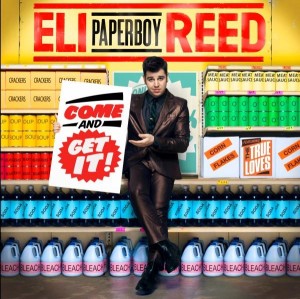
Eli “Paperboy” Reed sings and writes original, yet classic-sounding, R&B/soul. No, “Eli ‘Paperboy’ Reed” is not a pseudonym for my son the drummer. My son-the-drummer’s pseudonym is DJ Paradiddle.
Reed, 26, is big in Europe. Like on The Ed Sullivan Show (the modern-day Brit equivalent) and the cover of Rolling Stone (the Brit equivalent). Look for Come and Get It on Capitol Records and for Eli everywhere. He was on NPR “Weekend Edition” [hear] several days ago. He’ll probably be on late-night American TV soon.
I know a couple klezmer guys who are big, too, who played with Yiddishe Cup. Years ago the bass player for the Klezmatics did a gig with us in Toledo.
Ipso facto, there is no such thing as “big” in klezmer.
Eli Reed doesn’t play klezmer, though. When he performed with Yiddishe Cup, he did soul/R&B.
Reed and his band, the True Loves, have a gutsy Stax-like sound, which provides the core support to Reed’s emotive lyrics, which are rabbit punches to the solar plexus of young love. Example: “You went from name calling to calling my name. You went from school-yard teasing to all night pleasing.” That is clear-cut sawing in the coming-of-age forest.
Eli — they love him in España and France. I hope Eli “Paperboy” Reed becomes huge in America, and says in passing, “Yiddishe Cup is all right,” and Yiddishe Cup gets more gigs.
When you buy Eli “Paperboy” Reed’s Come and Get It, tell them — Reed, Capitol, iTunes, et al. — Yiddishe Cup sent you.
—-
1 of 2 posts for 8/18/10. Please see the post below too.
—-
See Yiddishe Cup 7 p.m. tomorrow (Thurs. Aug. 19) at Wiley Middle School, 2155 Miramar Blvd., University Hts., Ohio. Free. Indoors if raining.
August 18, 2010 2 Comments
20 YEARS TO LIFE
Yiddishe Cup is the house band at the Lake County (Ohio) Heritage Festival. We play there every July. Twenty years in a row.
Why don’t the organizers get somebody else?
Because we talk. Bluegrass bands and old-time musicians don’t talk. They just pick. Folk musicians, they’ll talk, but it’s pabulum about trees and trysts. Polka guys, they talk — to each other. And they mumble.
Lake County, just east of Cleveland, is a stronghold of Italians and Slovenians. Many are retired railroad and factory workers. They like to hear “Eaton Axle,” “Fisher Body,” and “Collinwood Railroad Yards.”
Those aren’t songs. They’re just words, and I like to say them. For instance, I’ll say, “Who remembers the Collinwood Yards on East One-hundred Fifty-second?” There are a couple klezmer train songs. There’s a hit from Russia: “7:40.”
We do “Gino,” an Orthodox Jewish tune with an Italian-sounding name. We also do “That’s Morris,” a parody of “That’s Amore.” We introduce it with: “This is by that great Ohio Jewish composer Dean Martin. His name in Hebrew means ‘flying tiny octopus.'”
You have to be there.
The Slovenians like to hear “Slovenian” pronounced properly: Slovene-yun, not Slovene-ian.
I explain Hebrew is loshn kodesh, the holy tongue, like Latin. Yiddish by contrast is mama-loshn, the mother tongue. “Mama Lotion. You can buy it at CVS.”
You have to be there.
—-
2 of 2 posts for 7/21/10
—-
Sun. (July 25): Yiddishe Cup is at the Lake County Heritage Festival, formerly the Little Mountain Folk Festival. Painesville, Ohio. $. www.lakehistory.org. Final revised schedule: Yiddishe Cup is on at 11 a.m., 1 p.m. and 4 p.m.
—–
Thurs., July 29: “Driving Mr. Klezmer” duo show at Cain Park, Cleveland Hts., 7 p.m. $20 in advance, $23 at the door. $2 off for 60+ and students. 216-371-3000 or www.cainpark.com. If you miss this show, your last words might be “I really screwed up.”
July 21, 2010 3 Comments
THE TOUGHEST JOB IN MUSIC
Subs are often the best musicians. They’re great ear players.
I’ve subbed a few times. One time I wore a suit instead of a tux and got The Ray (the stare) from the bandleader. Another time I iced my tendinitis during a break and almost missed the downbeat (the start of the next set).
I don’t do much subbing. I’m not the greatest ear player and my sight-reading skills are only so-so.
The worst player in the band should be the leader, who then hires people better than himself.
[Subliminal message for non-readers: Jump to the video at the end of this post.]
Playing by ear . . . that’s the big mysterious matzo ball of music. Fact: You can get better at playing by ear. A little better. First, close your eyes for a minute before practicing. Listen to the clock and your neighbor’s barking dog. Then play a couple notes, eyes closed, like C, D, and E, and imagine why they’re different. What is the distance between the notes?
You have no idea.
Follow up with a chromatic scale, C-C#-D-D#-E, and you’ll have an idea. The chromatic run sounds like swarming bees, à la “Flight of the Bumblebee.” This chromatic run “looks” zig-zaggy, as if you’re walking up the fire-exit steps at a downtown hotel. C is the first floor, C# is the landing, and D is the second floor. You begin to feel the intervals (the leaps).
Don’t underestimate the eyes-closed part. Pretend you have eye strain and need to rest your eyes.
If you’re a professional musician, try playing with your eyes closed on stage occasionally. It’ll clear the visual clutter. I spent 30 minutes at a concert trying to remember my kids’ preschool teacher’s name. She was in the audience. My kids are in their twenties. I should have had my eyes closed.
***
I encouraged a gentile Yiddishe Cup musician to attend KlezKamp, the klezmer convention, to learn klezmer conventions. When the KlezKamp registrar asked his Yiddish name, I interrupted, “Farbisener.” (Bitter One.)
My musician wore his Farbisener ID badge for five days. He could take a joke — barely.
I’ve had goys in Yiddishe Cup since the beginning. That’s no surprise. Have you been to an Orthodox Jewish wedding in the Midwest? The sole Jewish musician is often the singer, because he has to know Hebrew. The rest of the band might be jazzers, many of whom are cool dudes with cigs, fraying tuxes, and war stories about backing up Jerry Lewis and Tom Jones. Divide everything they say in half. But they can play — anything from Charlie Parker to Madonna.
Some subs, on the other hand, are not old jazzers; they are young music school grads who don’t smoke, don’t dress like shlubs, and know all the tunes — and are also full of BS. If a young sub says he just made $500, that means he drove to New York, slept on a couch, and didn’t calculate his travel expenses. He has never heard of depreciation.
I hired a sub from a small town near Canton, Ohio. (Yes, Canton is small, but this guy’s ville was very small.) He played terrific guitar and sang in Italian, Spanish and English. He had grown up in three countries. He claimed he did 260 gigs a year — a lot. Most were quality gigs, he said, although some were “wallpaper” (background music), and some outright sucked: “I had a gig playing dinner parties for the Hoover vacuum family.”
Subs need quips like that to regale the band at breaks. The regulars demand it; they are sick of each other’s jokes and stories.
The toughest job in music — subbing.
—-
This vid clip is from the “Driving Mr. Klezmer” show. Includes klezmer and Mickey Katz’s “16 Tons,” followed by Alan Douglass, on keyboards, reciting the first verse of Genesis in Hebrew. Not bad for a gentile.
See “Driving Mr. Klezmer” 7 p.m. Thurs., July 29, at Cain Park, Alma Theater, Cleveland Heights. $20 in advance. $23 at the door. Call 216-371-3000 or visit www.cainpark.com.
“Driving Mr. Klezmer” is a clutch-popping trip through the states of klezmer, pop, Tin Pan Alley and spoken word. The ride: a Ford Tsuris.
The show is a nudnik/beatnik mash-up of music and comedy. Bert Stratton is on clarinet and spoken word (i.e., this blog). Alan Douglass, the chauffeur, is on vocals and keyboards.
July 7, 2010 1 Comment
SOL HICCUP, IMPRESARIO
I am the Sol Hiccup — maybe — of klezmer shows in Cleveland. I am a volunteer on a Workmen’s Circle committee that has brought in Kapelye, Pharaoh’s Daughter, Theodore Bikel, Chava Alberstein, the Klezmatics, the Klezmer Conservatory Band, Shtreiml, Beyond the Pale, Susan Hoffman Watts and many more.
It’s not my money; it’s the Workmen’s Circle’s concert endowment earnings.
Many committee members don’t know much about Jewish music, so my opinion carries weight. Sometimes my picks work, sometimes not.
Anything experimental, feh. Too much kvitching (squeaking) on the clarinet, feh. Hebrew songs — no thanks, it’s a Yiddish concert. Obscure Yiddish songs — no thanks.
Last year the committee brought in Yiddishe Cup (from a distance of 7,920 feet). The band played mainstream klezmer and did Mickey Katz–style Yinglish comedy.
A committee member said the band didn’t play enough klezmer instrumentals. He said, “That’s what the Russians wanted to hear. They came to hear klezmer music, not . . .” He paused. “Ech, you were OK.” Not a bad review, considering this critic — a 94-year-old Yiddishist — often favored “horrible,” “not Jewish enough,” and “jazz – why jazz?”
Giora Feidman, the renowned Israeli clarinetist, played all instrumentals one year. That was nisht gut (no good). No vocals.
Where was the road to a good program? “Call Zalmen in New York,” according to one veteran committee member. Call Zalmen Mlotek.
Zalman is not 94 years old, even though his name is. Zalman is a baby-boomer pianist, theater director, and macher in the klezmer world. He knows just about every quality Yiddish performer.
Zalman’s job, from the concert committee’s standpoint, was to forestall repertoire malfunctions. The committee, which included several lawyers, stipulated performers should deliver “at least 70 percent Yiddish content.” No more all-instrumental shows or predominately Hebrew and English song fests.
For instance, the headliner in 2007 had counted “Di Grine Kusine” (The Greenhorn Cousin) 100 percent Yiddish content, even though his group’s version was mostly instrumental jazz solos. When I told him he hadn’t fulfilled his Yiddish quota, he said, “Why are you telling me this the minute I walk off stage!”
He had a point. I should have waited. But his pianist had taken more solos, on the clock, than his Yiddish vocalist.
I was only doing my job. And I was in trouble. I was coming off a bad year; I had recommended an “experimental” act the year before. I was losing my Sol Hiccup credibility.
We brought in a Canadian band, Beyond the Pale. They covered the bases, mixing klezmer instrumentals and Yiddish songs. I was redeemed for a while.
Then a long-time committee member quit. She said there wasn’t enough Yiddish, and hadn’t been enough mama-loshn (Yiddish/mother tongue) for more than a decade.
Azoy geyt es. (So it goes.)
A majority of the Yiddish-speaking audience was in the cemetery along with the committee’s top pick, Bruce Alder, a terrific Yiddish song-and-dance man who had died in 2008. Our concert ushers — World War II Jewish War Vets — were also with Bruce.
I played a party for Jewish war vets. They were Vietnam guys, looking just like World War II vets, except breathing. The vets liked “Old Time Rock and Roll.” I couldn’t see them ushering a klezmer concert.
This summer’s Yiddish concert is Sunday, featuring “New Voices of the Yiddish Stage,” an ad hoc musical variety show from Folksbiene — Zalmen Mlotek’s theater in New York. The musicians are in their twenties and thirties. Clarinetist Michael Winograd alone is worth the price of admission.
Aside to the “New Voices” performers: Jazz is a four-letter word west of the Hudson.
—
The 32nd annual Yiddish Concert in the Park is 3 p.m. Sun. (June 27) at Cain Park, Evans Amphitheater, Cleveland Heights. Free admission. The concert is a co-production of the Workmen’s Circle and the City of Cleveland Heights.
June 23, 2010 3 Comments
CROSSOVER
Everybody in world music wants to be the next crossover act.
Eddie Blazonczyk, the Chicago Polish polka musician, tried. And then there was Ruben Blades, the Panamanian salsa guy.
In klezmer, nobody has done it lately.
Lately is the key word. [Continue by clicking on video]
CLOSED CAPTION. 6/4/10. The paragraphs below are what the man in the video is saying, more or less, prior to playing “Bay Mir Bistu Sheyn” . . .
In 1938 the Andrews Sisters made “Bay Mir Bistu Sheyn” (By Me You Look Grand) the number one song on the American pop charts.
“Bay Mir Bistu Sheyn” is the tune in the klezmer concert repertoire.
Yiddishe Cup was playing a concert in Detroit — just barreling through a medley of esoteric klezmer fusion — when I called an audible (changed the set list) to play “Bay Mir Bistu Sheyn.” Bingo, the mostly elderly crowd was right back with us.
My daughter, when she was little, called the song “My Bear, Mr. Shane.” My youngest son performed it at 3 ½. [Check out the boy’s video.] Jazz musicians call the tune “My Beer is Duquesne.”
Only Jews think “Bay Mir Bistu Sheyn” is Jewish. Everybody else thinks it’s German or plain nothing. (The spelling on the original record label was “Bei Mir Bist du Schön.”) I lectured a group of gentile senior citizens in Westlake, Ohio. I asked if they knew “Bay Mir” was Jewish. None did.
Sholom Secunda wrote the melody to “Bay Mir Bistu Sheyn” for a Yiddish play in 1932. Then he sold the rights to a music publishing house, the Kammen Brothers, for $30.
Sammy Cahn and Saul Chaplin put English words to the Yiddish version. The tune became a huge hit for the Andrew Sisters.
Secunda supposedly had a conversation with a shoeshiner, who was whistling “Bay Mir” in 1938:
Secunda: “That song is making quite a hit now, isn’t it?”
Shoeshiner: “Hit ain’t the word. It’s a riot.”
Secunda: “I guess the guy who wrote that must be making plenty of dough.”
Shoeshiner: “Not him. That dope sold his song for thirty bucks.”
Secunda: “And that isn’t the half of it . . .” **
**From the Camden (N.J.) Courier-Post, Jan. 26, 1938.
Secunda had to split the $30 fee with the original Yiddish lyricist, Jacob Jacobs.
A Jewish tune crosses over to the big-time about once a century. That’s my guess. I’m thinking the next hit will be the Hip Hop Hoodios’ “My Nose is Large and You Know I’m in Charge.”
—-
On Sat. June 12, Yiddishe Cup plays the best event in Cleveland, Parade the Circle. We’re not marching in the parade; we’re playing a post-parade concert at 1 p.m. on Wade Oval. Gonna be a massive bar mitzvah party.
June 2, 2010 7 Comments
STANDING IN THE SHADOW OF LeBRON
1. GOT A CARD? NO!
I was a guest at a wedding where the band’s sign was bigger than LeBron James. The banner was eight-foot, like something you might see on a telephone pole announcing “125 years of excellence in education.”
The wedding reception was elegant, but the band’s sign was totally Bedford Auto Mile. The sign read “More Acts, Better Music, Higher Standards.”
Higher Standards? The bandleader was Italian. I knew him. Roman standard bearers? The bandleader said to me, “It’s better to be a guest than to work, huh?”
What? I always prefer playing over schmoozing.
When Yiddishe Cup does weddings, I hand out business cards. Nothing gaudy. And I don’t shovel them out. These cards are almost collectors’ items. I’m not going to pass them out willy-nilly.
Everybody already knows Yiddishe Cup. If you say “klezmer band” in Ohio, it’s us. Now, if we’re in Buffalo, N.Y., for example, I might go heavier on cards. But I don’t put out a tray. That’s too dental office.
Granted, we feature Yiddishe Cup’s logo on our bass drum. Our logo is cool, whimsical and tasteful, and it gets us some gigs. (Ralph Solonitz designed the logo.)
At the “Higher Standards” wedding, I met a businessman who did music production as a sideline. I asked for his card. He didn’t have one. And he had 100 employees, he said.
He had achieved placid-plus status: no card.
My goal is to be him.
***
2. BALLISTIC / LOADING / CAVS
A Yiddishe Cup musician went ballistic when he saw a college football game, or so he thought, off in the distance. He said, “I’m so through with this country’s obsessions with sports!”
Yiddishe Cup was loading-in at a student union by a college stadium.
The Yiddishe Cup musician had fouled. Here’s why: (1.) The college kids were playing lacrosse, not football. (2.) It was a Division III game. The stadium was small, with no crowd to speak of. (3.) The kids were getting some exercise; this was not a big money, faux-pro game.
Yiddishe Cup musicians, for the most part, are not up on today’s sports scene. For instance, I just learned a basketball shot “from downtown” means a three-pointer. And I’m wondering what “the post” is. I watched several basketball games lately.
I have an agreement with my cousin George, a serious sports fan, to go to the Cavs victory parade. I want to be there. Depends on my Depends though, because I’ll be very old. Also, depends if it’s raining. I’m fair weather.
Last Sunday Yiddishe Cup had a gig, a pre-Shavuot Torah dedication/celebration, which was almost postponed to accommodate LeBron James’ reading of the Book of Kells. The Cavs were scheduled to play the Celtics then. (Cleveland lost prior, on Thursday, so the playoff series ended, and everything worked out fine for the Torah dedication.)
About championships . . . My father, Toby, promised to take me to the World Series, but the Tribe never made it when I was growing up. My dad, instead, took me to Ohio State homecoming games.
I took my kids to the 1992 OSU homecoming game. The Ohio Stadium scoreboard lit up: This Sat. at the Wexner Center, Don Byron Salutes Mickey Katz.
What next, Bucks? “Fight the Team Across the Field” in Yiddish?
Don Byron played OSU, I think, because Columbus resident Les Wexner, the billionaire owner of The Limited, paid Byron’s band to entertain Wexner’s elderly mother, who probably requested the Mickey Katz show because she didn’t want to fly to New York. That’s the only logical explanation. Don Byron never played any other Mickey Katz–tribute shows in Ohio.
Go Mickey.
Go Katz.
Go ‘Cats.
Go Cavs.
If you’re a Cubs fan, or whatever, be quiet about your sports-induced suffering. You don’t know anything.
May 19, 2010 3 Comments
SYNCIN’ WITH CINCO
A banda clarinetist in Sinaloa, Mexico, lent me his axe. I played horribly because of that clarinet’s craggy reed; I’ve seen better reeds in a fourth grader’s case. I played a Meron/Israeli nign (wordless melody). The Mexican listeners clapped. They could have whistled.
That was my sole south-of-the-border performance. (My family was on a hiking trip in northern Mexico, where we stumbled upon a horse auction with oompah banda.)
A Cleveland woman announced her Central American wedding — a Jewish ceremony in San Salvador. I told the bride’s mother to hire Yiddishe Cup. “I’m sure the groom’s family can afford it,” I said, “or they wouldn’t still be down there.” The mom agreed to the “afford it” part, but not the band. The mom burned a CD of horas from my wife’s collection and took that.
Yiddishe Cup plays Latin music fairly well. We have cornered the Latin Jewish doctor market in Cleveland — a market that fits comfortably into the backseat of a Camry. We did a gig for a Mexican Jewish doctor who headed the Cleveland Clinic evil eye center (Cole Eye Institute). That was one salsa-dik party. Latin Jews party second only to Russian Jews.
We played a Cleveland Ecuadorian wedding where I explained the chair-lifting tradition to the groom’s gentile parents. I said in Spanish: “You will see people seated in chairs in the wind.”
***
In Dallas, when Yiddishe Cup musicians visited the grassy knoll, I stopped at the neighborhood taco shop to update myself on Mexican drinks.
The taco shop had orange, carrot, horchata, mango, guava and Sidral apple drinks. They also had bottled Mexican Coke. The clerk explained Mexican Coke is sweeter than American Coca-Cola.
Yiddishe Cup’s ultimate hip-spanic thrill was an outdoor concert in El Paso, Texas, where we played “La Bamba” for 2,500 predominately Mexican-American listeners. For Jewish flavor we added Hebrew lyrics from Psalm 133 (“Hine Ma Tov” / Behold how good ). We borrowed that idea from a Kansas City band, Guns ‘n’ Charoses.
From the bandstand, we could see the Rio Grande. We played “Meshugeneh Mambo.” We said gracias a lot.
So close to Latin America.
Cinco de Mayo. Hoy. (Pronounced “oy.”)
—-
1 of 2 posts for 5/5/10. See the next post too, please.
May 5, 2010 1 Comment
DOWN ON THE CORNER
Busking is a British term. In the Midwest we say “playing on the street.” Kind of awkward, but we don’t want to sound British.
In the 1990s, several Yiddishe Cup musicians played on the streets in downtown Cleveland and made nothing. Security guards shooed us away from Higbee’s and the Arcade entrance.
Our parking expenses were more than what we made. Then we ate out and lost even more money.
We were certainly contributing. We were putting the viva back in city.
The bus exhaust stunk. The passersby ignored us — except for the bums, who ogled our money pot. Our gelt was immense.
***
I have “busked”; I played on the streets abroad. (Northern Mexico, 2008, doesn’t count; that was a freebie.) In 2006 I made 16 shekels ($4) on Ben Yehuda Street in Jerusalem. I had my axe with me in Israel, so why not play for my people?
My people wanted Dixieland. “The Saints Go Marching In” was killer. A charedi (ultra-Orthodox) boy kept asking for it. I tried klezmer but that didn’t sell, except for “Anim Zemiros.” (Song of Glory)
The tzedakah (charity) collectors eyed my coins. Again, awkward. Give it up for the charedim.
There is a new video clip of Pete Rushefsky, the renowned klezmer musician, playing on the boardwalk in Brighton Beach, Brooklyn. Pete is wearing a glove, the wind is blowing, and there is a sole listener, who says to Pete: “My grandfather used to play this stuff.” Great stuff — the video. Turns out the grandpa was Louis Armstrong.
Not exactly. Grandpa was Jack Boogich of the historic Romanian klezmer family. For hardcore klez fans only, check out this link. Scroll to the bottom of the text for the Brighton Beach video.
—-
2 of 2 posts for 5/5/10
May 5, 2010 1 Comment
THE LIFE CYCLE DIARIES
1. CHEERS FOR “L’CHAIM”
I had a funeral gig, or thought I did. The deceased, Sid Elsner, had booked me years prior. Sid wanted a New Orleans-style, jazz-klezmer element at his funeral. Not a kosher concept, but neither was Sid. [Goys: Jews don’t often have music at funerals.]
When Sid died, none of his adult children mentioned music, so I didn’t play.
At the gravesite, I got a recipe for Sid’s brisket. His oldest son was passing out the secret list of ingredients (chili sauce, onions).
Food works. That’s why there are shiva (mourning) meals.
A musician in Yiddishe Cup has attended only one funeral. He has been to hundreds of weddings and one funeral. Lucky.
My mother’s favorite song was “Shenandoah,” which we sang it at her stone setting but not at her funeral.
My dad didn’t have a favorite tune.
Yiddishe Cup’s singer, Irwin Weinberger, wants Yiddishe Cup to play at his funeral. I hope I can oblige.
After a 2000 Yiddishe Cup gig, I stopped at my father’s grave with my youngest son, who placed an old clarinet reed on my dad’s headstone. My son had just played his first paying gig, on drums, with Yiddishe Cup. I wanted to let my father know I was still around, still pushing the ball — cutting the grass, raising a family, starting a klezmer dynasty. That last notion — the klezmer dynasty — would have flummoxed Toby, my father. The last time Toby had heard me play I was a Cannonball Adderley wannabe.
. . . Here’s some advice for Jewish dads doing toasts at weddings: make your speech funereal. Pretend you’re updating your dead father, even if he’s alive. Use flashbacks and talk about your kid’s personality quirks. Stay on the high road; let the maid of honor do the weird stuff. And end with “L’chaim,” even if you’ve never said it before. “Cheers” from a Jew is a big turn off.
***
2. TOWER OF POWER
It’s unnerving when the bride ditches her own wedding. She gets the flu for example, or a headache or swollen ankle, and has to lie down for a few hours. Misses the whole party. That marriage may not last.
Worse: the mom dies during the “Chicken Dance.” That happened. Not at my gig, but at one my video guy was at.
Did my video guy get it on tape? I don’t know. The video guy died on me. Not at my gig, but slowly, over months.
He didn’t move around much; he had a stationary video rack. He just stood by his rack, which I called the Tower of Power, and barely budged the whole night. In his final days, he really bugged me. For instance, when Yiddishe Cup would stroll table-to-table taking requests, like klezmer-achis, he would tell me which tables to go to. “Can you do the head table next?” he would ask.
I didn’t know he was that sick. “Why?” I said.
“Because I want to sit down,” he said.
I said no. The head table was nowhere near us. We had a traffic pattern to maintain.
He said, “I’ll remember this when you want a favor.”
Then he died.
—
Yiddishe Cup plays Mon. April 19, 6:35 p.m., for the community-wide Yom Ha’atzmaut (Israel Independence Day) celebration at B’nai Jeshurun Cong., Cleveland.
April 14, 2010 6 Comments
STOP TALKING AND PLAY
Jim Guttmann, the bass player in the Klezmer Conservatory Band, said his biggest thrill was playing nursing homes. Guttmann, who has toured the world, can pull that off. He said nursing home residents appreciated him the most.
Other jet-setting klezmers claim young Germans are the best audience. Or the Poles. Some of these young Europeans treat the visiting klezmer musicians very deferentially, like Old West buffs treat Indians at powwows: “Nice to see you made it through, dude.”
I don’t know about Europe, but I do know about the nursing home scene. If you don’t play “Tumbalalaika” and “Bay Mir Bistu Sheyn,” don’t bother showing up. Those tunes are classics.
Humor goes over too — usually. I did a comedy number at a nursing home, and an old man in a wheelchair interrupted, “Play music! Sit down!”
I was heckled, I was flustered, and I blurted out, “I’ll sit down when you stand up!” That quieted him — and everybody else.
When I’m in an audience, I often feel like bellowing “Talk!” at the performers. I don’t go for the laconic Miles Davis/Bob Dylan model.
Performers: Make your banter interesting. Don’t just say, “The next tune is . . .” Tell the audience about your favorite candy bar — anything. Say more than the set list.
At Yiddishe Cup’s next nursing home gig, I’m going to read blogospheric Klezmer Guy prose while our keyboard player improvises behind me. One piece might be “Stop Talking and Play.” I’ll read two paragraphs, pause, and my keyboard player will lead the audience in a shout chorus of “Stop talking and play!” I’ll read a couple more paragraphs, and again the audience will shout the chorus. This will continue until we play “Tumbalalaika.”
—-
1 of 2 posts for 2/24/10. Please see the post below too.
February 24, 2010 5 Comments
TODAY I AM A HOLDING PEN
At some bar mitzvahs, the teens are kept in a holding pen — a separate room — with a DJ, while the klezmer band plays in an adjacent room for the older people.
I prefer everybody in the same room, but I’m not in charge. A party planner is.
Reality: It’s rare to see a klez band in any room at any bar mitzvah. Klez is the Uncola and DJ is the cola — Coke, Pepsi and cocaine combined.
The good news: Klezmer attracts interesting customers. These clients don’t let their kids tell them what to do — entirely. These clients might want a Jewish theme for a party, as opposed to a ski theme. These clients might not like ear-splitting DJ music. These clients might not relish watching their kids perform simulated sex to rap. In other words, these clients are out-of-it professors, aeronautical engineers and musicians.
Musicians — as clients — love to hire other musicians. The problem is many musicians are broke. Luckily, some are married to doctors. We get these gigs. We always eat well there. That’s a big thing with musician clients — making sure the musicians eat well.
Hadassah sponsors Simchapalooza, a bar mitzvah fair, every year, where bar mitzvah moms go to the I-271 Marriott to check out DJs, balloon twisters, video guys and caterers.
I had a booth one year. I shouldn’t have. A herring-reeking klemzer guy up against Giant Inflatables. I lost.
The Bar Mitzvah King — DJ Terry Macklin — had about three tables at Simchapalooza. He was full-service: invitations, catering, canned music and photo booths. Everything except haftorah tutoring.
Macklin drove a Jag.
Then Terry got kind of old, so younger guys encroached on his coolness turf. Rock the House is the DJ company now. They aren’t black like Macklin, but they’re working on it.
There was another DJ, Joey Gentile, who advertised “Mitzvah services” in the Cleveland Jewish News. I sent that ad to Moment — the national Jewish mag — for its spice box humor section, where Moment regularly reprints media and signage faux pas, like “Easter Challah $3.99 Special.” Moment adds a wry caption, such as, “So that’s what they ate at the Last Supper.”
My Joey Gentile mitzvah ad didn’t make it into Moment. It should have, with the caption, “A gentile mitzvah. No bar? Not likely.”
A New York salesman from the Bar Mitzvah Guide phoned me to buy an ad in his slick glossy, which his company distributed throughout the Midwest. The Bar Mitzvah Guide carried ads for everything from bottle dancers to personalized chocolate bars. The salesman called me way too often. Finally, I said, “I’ll place an ad, but I bet you won’t take it.”
He said, “Try me.”
I said, “I want the text to read ‘Yiddishe Cup. If the other ads here aren’t your bag, we are.'”
He took the ad.
We didn’t get any gigs.
—-
Yiddishe Cup is at Nighttown, Cleveland Hts., 7 p.m. Sun., Feb. 28. $15.
February 17, 2010 2 Comments
CLARINET CONVENTIONS
Clarinet players are sometimes a bit behind the times. If you subscribe to The Clarinet magazine, you’ll see. There are a lot of photos.
Toodles in ’12. Benny Goodman for President.
Many clarinetists, myself included, mimic Goodman. He’s the latest thing. We stand ram-rod straight, wear suits, and have facial muscles twisted tighter than model airplane propellers.
U.S. military band clarinetists are a subspecies of clarinet antediluvians. They are all sergeants for some reason. These soldiers aren’t shimmying under any barbed wire fences for you. They’re busy practicing, trying to get into The Clarinet magazine.
Clarinetists gather annually at Clarinetfest, Clarinetopia and Clarabell. (The last one is made up.) At these conventions, the workshop leaders are called clinicians. They come from SMU, KSU and OSU. Has to have an S in it. The clinicians teach college students how to become clinicians.
When I was a clinician at the Ohio Music Educators Association conference, I was a bit light in the bio department. No “B.M. from SMU,” no “soloed with the Wyoming Symphony,” no “studied with Hans WorseThan Most.”
I wrote I was the clarinetist and leader of Yiddishe Cup.
***
Not every clarinet player looks like an insurance agent. There’s Don Byron, the black guy with dreadlocks, and Paquito D’Rivera, the Cubano humano. Plus there are at least a dozen curly-haired Jewish clarinetists who look like Larry Fine from the Three Stooges. The principal clarinetist of the Cleveland Orchestra, Franklin Cohen, is a Larry Fine impersonator. Me too.
A black acquaintance, who ran into me in a restaurant, said, “Hi, Frank.” I corrected him, and the black man blushed, sort of.
I played two surprise birthday parties for Frank Cohen. Those were scary affairs because at least eight clarinet players were at each gig. Some of the clarinetists played “Happy Birthday” in a clarinet choir, which is similar to a vocal chorus, except it’s all clarinets: big, medium and little clarinets.
I, too, own a small clarinet — a C clarinet. The C is more piercing than the standard Bb horn, which is my main axe. (Bb is what everybody is familiar with.) There are also Eb clarinets, which are smaller than Cs. And even more obscure key clarinets.
The thing I never understood about music: Why all the different keys? Just get rid of some of them. Pare down.
Sid Beckerman, the legendary klez clarinetist, said, “To you, D minor is a key. To me, it’s a living.” D minor is the key of choice for klezmer clarinetists.
And what’s with transposing? If a clarinetist plays with a pianist or guitarist, the clarinet player has to play different notes than the ones written on the page.
I’m pretty good at it. When I see a written “C,” I can play “D” on the clarinet. It took me a while. It’s like a Swede learning Danish.
Here’s what is impossible: transposing quickly on the alto sax. When you see “C,” you play “A,” the relative minor. If the tune is incredibly slow, like a waltz, it’s doable.
Transposition keeps the riff-raff and dabblers off the bandstand. Just like in Judaism, where the prayer book goes backwards and the rabbi skips chunks of prayers and jumps around in the book without telling you. Just to make it hard.
January 27, 2010 3 Comments

